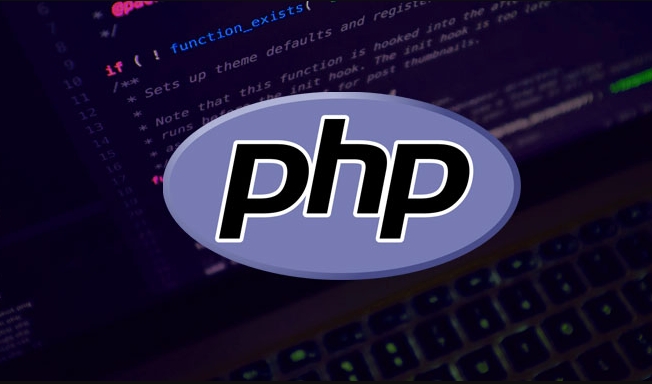PHP does not directly support wildcard searches in arrays, but can be implemented through fnmatch(), preg_grep() or custom functions. 1. fnmatch() supports shell-style wildcards, such as matching arbitrary characters, ? Match a single character, which is suitable for Unix systems and Windows environments in PHP 8; 2. preg_grep() uses regular expressions to provide more flexible pattern matching, such as /a/ matching elements containing a; 3. Custom functions can convert wildcards into regular expressions to implement specific rules, such as converting them to .* for matching. In addition, attention should be paid to performance optimization, case processing and special character testing.

When you're working with PHP arrays and need to search for elements that match a certain pattern, wildcards can be helpful. However, PHP doesn't support wildcard searches in arrays directly out of the box like some other languages ??or databases might. You'll need to implement custom logic depending on your needs.

Here are a few practical ways to use wildcard-like behavior when searching through PHP arrays.

Using fnmatch() for Wildcard Matching
If you're familiar with shell-style wildcards (like * for any number of characters and ? for a single character), fnmatch() is a great tool. It works well on Unix-based systems but may not behave the same way on Windows unless you're using PHP 8.
$array = ['apple', 'banana', 'cherry', 'date'];
$matches = array_filter($array, function($item) {
return fnmatch('*a*', $item); // Matches any item containing 'a'
});-
*matches zero or more characters. -
?matches exactly one character. - Use this inside
array_filter()for filtering array items.
Keep in mind: This function is case-sensitive by default. If you want case-insensitive matching, convert both strings to lowercase first or use the FNM_CASEFOLD flag:

fnmatch('*a*', $item, FNM_CASEFOLD);
Using Regular Expressions with preg_grep()
If you're comfortable with regex, preg_grep() is another powerful option. It allows you to search an array using regular expressions, which gives you much more flexibility than simple wildcards.
$array = ['apple', 'banana', 'cherry', 'date']; $matches = preg_grep('/a/', $array); // Finds all items containing 'a'
Some useful patterns:
-
/^a/– starts with 'a' -
/a$/– ends with 'a' -
/a.*z/– contains 'a' followed by any characters then 'z'
This method is especially handy if you're doing complex pattern matching.
Building a Custom Wildcard Search Function
If neither fnmatch() nor preg_grep() fits your exact needs, writing a custom function can help. For example, if you want to translate a basic wildcard string into a regex pattern:
function wildcard_match($pattern, $subject) {
$pattern = str_replace(['\*', '\?'], ['.*', '.'], preg_quote($pattern, '/'));
return (bool) preg_match("/^{$pattern}$/i", $subject);
}
$array = ['apple', 'banana', 'cherry', 'date'];
$matches = array_filter($array, function($item) {
return wildcard_match('*an*', $item); // Matches banana, etc.
});This approach lets you define your own rules for how wildcards should behave and can be extended easily.
A Few Notes Before You Go
- Performance matters — looping through large arrays repeatedly can get slow.
- Consider pre-filtering or caching results if you're doing multiple searches.
- Make sure to test edge cases, especially around uppercase/lowercase handling and special characters.
Basically that's it.
The above is the detailed content of how to use wildcards to search a php array. For more information, please follow other related articles on the PHP Chinese website!

Hot AI Tools

Undress AI Tool
Undress images for free

Undresser.AI Undress
AI-powered app for creating realistic nude photos

AI Clothes Remover
Online AI tool for removing clothes from photos.

Clothoff.io
AI clothes remover

Video Face Swap
Swap faces in any video effortlessly with our completely free AI face swap tool!

Hot Article

Hot Tools

Notepad++7.3.1
Easy-to-use and free code editor

SublimeText3 Chinese version
Chinese version, very easy to use

Zend Studio 13.0.1
Powerful PHP integrated development environment

Dreamweaver CS6
Visual web development tools

SublimeText3 Mac version
God-level code editing software (SublimeText3)

Hot Topics
 What are some best practices for versioning a PHP-based API?
Jun 14, 2025 am 12:27 AM
What are some best practices for versioning a PHP-based API?
Jun 14, 2025 am 12:27 AM
ToversionaPHP-basedAPIeffectively,useURL-basedversioningforclarityandeaseofrouting,separateversionedcodetoavoidconflicts,deprecateoldversionswithclearcommunication,andconsidercustomheadersonlywhennecessary.StartbyplacingtheversionintheURL(e.g.,/api/v
 How do I implement authentication and authorization in PHP?
Jun 20, 2025 am 01:03 AM
How do I implement authentication and authorization in PHP?
Jun 20, 2025 am 01:03 AM
TosecurelyhandleauthenticationandauthorizationinPHP,followthesesteps:1.Alwayshashpasswordswithpassword_hash()andverifyusingpassword_verify(),usepreparedstatementstopreventSQLinjection,andstoreuserdatain$_SESSIONafterlogin.2.Implementrole-basedaccessc
 What are the differences between procedural and object-oriented programming paradigms in PHP?
Jun 14, 2025 am 12:25 AM
What are the differences between procedural and object-oriented programming paradigms in PHP?
Jun 14, 2025 am 12:25 AM
Proceduralandobject-orientedprogramming(OOP)inPHPdiffersignificantlyinstructure,reusability,anddatahandling.1.Proceduralprogrammingusesfunctionsorganizedsequentially,suitableforsmallscripts.2.OOPorganizescodeintoclassesandobjects,modelingreal-worlden
 What are weak references (WeakMap) in PHP, and when might they be useful?
Jun 14, 2025 am 12:25 AM
What are weak references (WeakMap) in PHP, and when might they be useful?
Jun 14, 2025 am 12:25 AM
PHPdoesnothaveabuilt-inWeakMapbutoffersWeakReferenceforsimilarfunctionality.1.WeakReferenceallowsholdingreferenceswithoutpreventinggarbagecollection.2.Itisusefulforcaching,eventlisteners,andmetadatawithoutaffectingobjectlifecycles.3.YoucansimulateaWe
 How can you handle file uploads securely in PHP?
Jun 19, 2025 am 01:05 AM
How can you handle file uploads securely in PHP?
Jun 19, 2025 am 01:05 AM
To safely handle file uploads in PHP, the core is to verify file types, rename files, and restrict permissions. 1. Use finfo_file() to check the real MIME type, and only specific types such as image/jpeg are allowed; 2. Use uniqid() to generate random file names and store them in non-Web root directory; 3. Limit file size through php.ini and HTML forms, and set directory permissions to 0755; 4. Use ClamAV to scan malware to enhance security. These steps effectively prevent security vulnerabilities and ensure that the file upload process is safe and reliable.
 What are the differences between == (loose comparison) and === (strict comparison) in PHP?
Jun 19, 2025 am 01:07 AM
What are the differences between == (loose comparison) and === (strict comparison) in PHP?
Jun 19, 2025 am 01:07 AM
In PHP, the main difference between == and == is the strictness of type checking. ==Type conversion will be performed before comparison, for example, 5=="5" returns true, and ===Request that the value and type are the same before true will be returned, for example, 5==="5" returns false. In usage scenarios, === is more secure and should be used first, and == is only used when type conversion is required.
 How can you interact with NoSQL databases (e.g., MongoDB, Redis) from PHP?
Jun 19, 2025 am 01:07 AM
How can you interact with NoSQL databases (e.g., MongoDB, Redis) from PHP?
Jun 19, 2025 am 01:07 AM
Yes, PHP can interact with NoSQL databases like MongoDB and Redis through specific extensions or libraries. First, use the MongoDBPHP driver (installed through PECL or Composer) to create client instances and operate databases and collections, supporting insertion, query, aggregation and other operations; second, use the Predis library or phpredis extension to connect to Redis, perform key-value settings and acquisitions, and recommend phpredis for high-performance scenarios, while Predis is convenient for rapid deployment; both are suitable for production environments and are well-documented.
 How do I perform arithmetic operations in PHP ( , -, *, /, %)?
Jun 19, 2025 pm 05:13 PM
How do I perform arithmetic operations in PHP ( , -, *, /, %)?
Jun 19, 2025 pm 05:13 PM
The methods of using basic mathematical operations in PHP are as follows: 1. Addition signs support integers and floating-point numbers, and can also be used for variables. String numbers will be automatically converted but not recommended to dependencies; 2. Subtraction signs use - signs, variables are the same, and type conversion is also applicable; 3. Multiplication signs use * signs, which are suitable for numbers and similar strings; 4. Division uses / signs, which need to avoid dividing by zero, and note that the result may be floating-point numbers; 5. Taking the modulus signs can be used to judge odd and even numbers, and when processing negative numbers, the remainder signs are consistent with the dividend. The key to using these operators correctly is to ensure that the data types are clear and the boundary situation is handled well.






